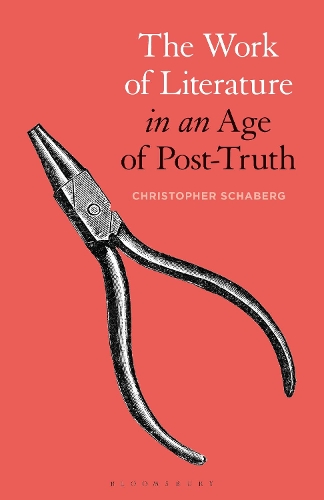
The Work of Literature in an Age of Post-Truth
(Paperback)
Available Formats
Publishing Details
The Work of Literature in an Age of Post-Truth
By (Author) Dr. Christopher Schaberg
Bloomsbury Publishing PLC
Bloomsbury Academic USA
26th July 2018
United States
Classifications
Tertiary Education
Non Fiction
Applied ecology
Philosophy and theory of education
809.05
Short-listed for The PROSE Award 2019 (United States)
Physical Properties
Paperback
168
Width 140mm, Height 216mm
240g
Description
A 2019 Prose Award Finalist What is the role of literary studies in an age of Twitter threads and viral news If the study of literature today is not just about turning to classic texts with age-old questions, neither is it a rejection of close reading or critical inquiry. Through the lived experience of a humanities professor in a rapidly changing world, this book explores how the careful study of literature and culture may be precisely what we need to navigate our dizzying epoch of post-truth politics and ecological urgency.
Reviews
An urgent and searching reappraisal of what it means to read and to teach literature in this post-truth context ... [Schaberg's] slim and highly readable book is the product of a teachers attempt to become re-enchanted with his trade ... It is candid and relaxed, and full of insight, as well as Schabergs enthusiasm for and anxieties about literature and literary studies today. * Times Higher Education *
Beginning with his own years as an undergraduate at a small liberal arts college in Michigan, Schaberg traverses time and space considering his pursuits as a teacher and a scholar, and as a citizen while on sabbatical. Key among Schabergs present concerns is how to decide on texts in a Trumpian world, and whether the lens through which such pedagogic choices are made has been permanently altered. Interspersing the narrative with mushroom hunting in northern Michigan and playground meandering with his young son, Schaberg takes the reader along for an unpredictable and, at times, humorous semantic ride. The book reveals Schaberg's genuine concern for the future of his studentsand all students, be they of the academy or of the world. * CHOICE *
Schaberg finds plenty of reasons to worry in his new book [...] But he also sees reasons why literary study is more important than ever. * Inside Higher Ed *
Schabergs approach is notably different from other popular commentaries Not being so enamoured with the liberal world order under attack from Trump, Rees-Mogg and company, Schaberg demurs from advocating on its behalf. Rather, if the book offers a response to our timesand its tone is sincerely upliftingthis is in the form of deep reflection on what it means to be human, to be placed on a finite and material earth, and to be situated amongst others Avoiding both the standard self-referential style of academics writing about academia and the knee-jerk vituperation characteristic of journalistic think-pieces, Schabergs book is a fine example of the soft skills which are the humanities stock-in-trade Schaberg is brilliant in his description of the entanglement of literature and the embedded world, showing us how the messiness of the arts and humanities prepares us for the messiness of life. * Review 31 *
Schaberg takes readers to various locations, allowing them to eavesdrop on his thoughts Schaberg soars when talking about language. * Publishers Weekly *
The Work of Literature in an Age of Post-Truth captures the essence of what it is like to experience the wildness of the 21st century as an observant, thinking human. The banalities of everyday life mix here with the political urgencies and mediatic confusion of our age. Schaberg has sketched a convincing portrait of this unsettling moment. * Christy Wampole, Associate Professor of French, Princeton University, USA, and author of Rootedness: The Ramifications of a Metaphor (2016) *
Earth to reader: come in, do you read me, over. Think about it. Ecological awareness implies taking into account a hugely expanded set of nonhuman beings. This means more nuances and ambiguities. There are people who have trained to tolerate plenty of both: they are called literature scholars. Literary ways of sustaining patriarchal racist heteronormative (and so on) are done: we know too much now. But that doesnt mean the journey of reading literature is over, as if only white guys wrote poems. This rapidly cascading kaleidoscope of lovely readings and thoughts about reading, by the generous and imaginatively mercurial Christopher Schaberg, shows you how, amounting to a guidebook on proclaiming the significance of the Humanities in visualizing different futures. * Timothy Morton, Rita Shea Guffey Chair in English, Rice University, USA, and author of Being Ecological (2018) *
Schaberg asks us to consider the work of literature not so much as an antidote to 'post-truth' political culture in the USA as an alternative way of life. Here literature figures as lively engagement with the world, a practice of enthusiasm and commitment. * Stephanie LeMenager, Moore Endowed Professor of English and Environmental Studies, University of Oregon, USA, and author of Living Oil: Petroleum Culture in the American Century (2014) *
Author Bio
Christopher Schaberg is Dorothy Harrell Brown Distinguished Professor of English at Loyola University New Orleans, USA. He is the author of The Textual Life of Airports (2013), The End of Airports (2015), and Airportness (2017), as well as co-editor of Deconstructing Brad Pitt (2014), all published by Bloomsbury. His writing has appeared in, among other publications, The Atlantic, Inside Higher Ed, The Los Angeles Review of Books, 3:AM Magazine, Public Books, and The New Inquiry.
